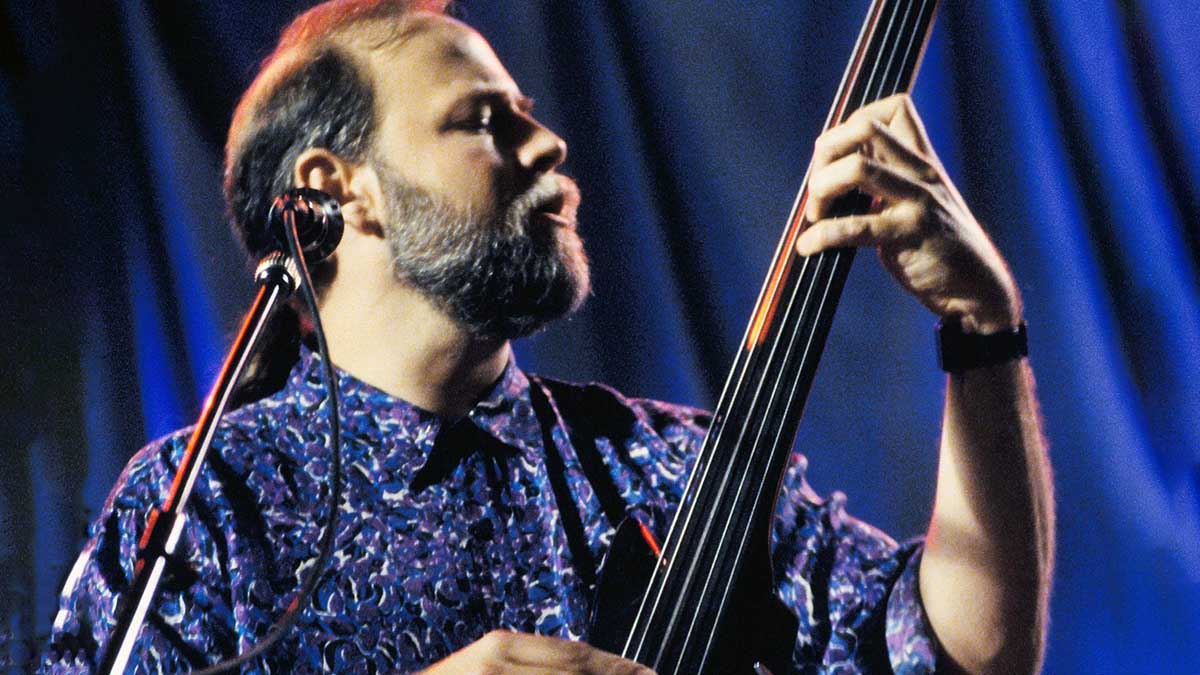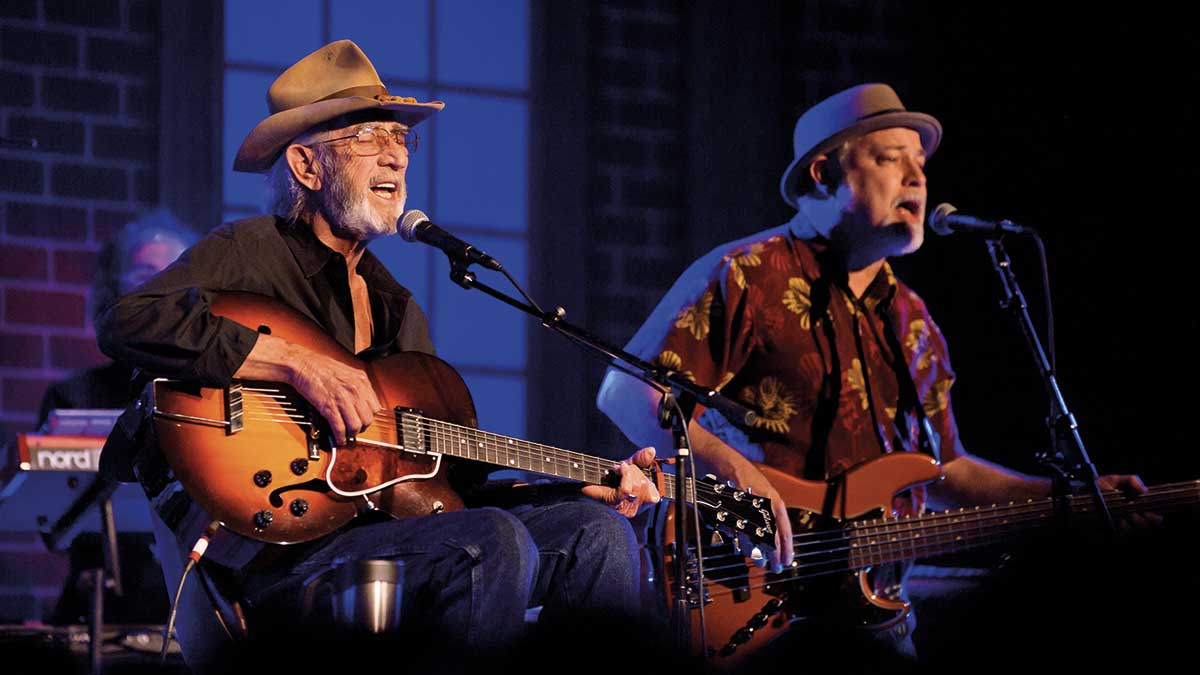Dave Pomeroy: “Banjo bass, string bass… I did one song with nine tracks of uke bass. There are a million different ways to play the bass”
Pomeroy has played on over 500 albums, collaborating with the likes of Sting and John Fogerty, and here he talks all things low end and how he ended up directing a bass orchestra

Dave Pomeroy has played with artists such as Sting, Willie Nelson, John Fogerty, Peter Frampton, Johnny Cash, Earl Scruggs, Earl Klugh, Adrian Belew, The Chieftains, Neil Diamond, Steve Winwood, and Elton John.
In addition, Pomeroy is a former Bassist of the Year, Studio Musician of the Year, a member of the Jazz Band of the Year, has recorded three bass guitar albums, conducted the All-Bass Orchestra, and is currently the president of the Nashville Musicians’ Union. A bass player with wisdom to spare, then...
You have quite a resume, Dave. Tell us how it all started.
“My dad was in the military, and when I was five, we moved to England. The Beatles’ first record came out and they were just everywhere, man. But to me, the Beatles were like an oil painting or sculpture – a work of art, not something to dissect.
“We moved back to the States and in fifth grade, I signed up to play cello in school orchestra. They already had a few cellists, so the teacher steered me towards string bass and I fell in love with it. At 13, I finally got my hands on an electric and learned Sunshine of Your Love.”
Uh-oh.
“Oh, yeah. That was my first riff. My sister’s boyfriend taught it to me. I thought ‘You mean I can do this without sheet music?’ That’s when I started obsessively playing along with records. Spoonful, Cream’s live version was 16 minutes and 44 seconds of E. I drove my parents crazy.”
Get The Pick Newsletter
All the latest guitar news, interviews, lessons, reviews, deals and more, direct to your inbox!
What was your first bass and amp?
“I mowed lawns all summer and bought a Kingston for 40 bucks. The neck went, so I managed to talk my folks into buying me a Silvertone for $30. Finally, I traded my string bass for a Gibson EB-2, because I loved Jack Bruce. I played it through the input of Dad’s tape recorder and learned if I pulled the plug halfway out, it got louder. That blew the speakers, of course, so I got a Silvertone amp and 6x10 cab. I kept blowing that up, too. I can still smell solid-state circuits frying.”
You weren’t tempted to switch to guitar?
“Never. Guys like John Entwistle, Jack Bruce, Chris Squire – bass was a lead instrument in their hands. To me, bass is infinite. There’s always more to learn. By senior year of high school, I was gigging four nights a week and going to class at seven AM. Then I got accepted to the University of Virginia and joined a folk trio.
“We started making money and I was like, ‘Why am I in college?’ My dad was stationed in Belgium, so I flew over with my gear and said, ‘I dropped out of school. I want to move to London and be a rock star.’ I moved there on a Wednesday, saw an ad in Melody Maker for a band called Dragon’s Playground, got the gig, and filed with immigration for my work permit on Monday. Next, I joined Orb, a jazz group.”
Did you have a jazz background?
“Dad played jazz around the house, and Chick Corea’s Light As A Feather [1972] came out when I was 18. That was the wake-up call. Then I discovered Charlie Mingus. That’s the three for me – Jack Bruce, Mingus, and Eberhard Weber.”

There’s a name you don’t hear enough.
“Jaco was getting a lot of attention, but I loved what Eberhard was doing. That fat, trombone sound he had.”
So you’re living in London, playing in a band...
“Several bands! One of them got a gig in Copenhagen. We played six hours a night for 28 days. That’ll stretch you. Eventually, my work permit ran out and I had to move back to the States. It was New York, L.A., or Nashville. The singer from our folk trio had moved to Nashville, and I moved here in ’77. But I couldn’t get session work right away, because I played too many notes.”
What was your first job?
“I put up a makeshift business card on the music store wall and [legendary country artist] Sleepy LaBeef called. ‘Can you play bass?’ Yes. ‘Can you sing?’ Yes. ‘Can you leave tomorrow?’ I didn’t understand that Sleepy was passing through town looking for a bassist. We camped out at a truck stop north of Boston and played the New England area for eight months.”
Sounds like a rough way to pay your dues.
“Oh, the living conditions were horrific, but musically, it was a great education. Sleepy was an encyclopedia of what’s now called Americana. We’d go from Willie to Bo Diddley to Tex Ritter. No charts. No rehearsal. Listen, watch, and learn. I finally got back to Nashville and went to work for Guy Clark.
“His songs were so simple and beautiful, I had to rethink my approach. After that, I got the job with Don Williams. It was the biggest crowd I’d ever played to... and the quietest. They really listened. Scary.”
You did go to college. It’s one lesson into the next.
“It really was. Don opened all the doors. Sessions, songwriting. He demystified the process. The best musical advice I’ve ever gotten was from Don. I’d been in the band about six months and was still struggling to simplify. He said, ‘David, you don’t have to play what’s on the record. Just don’t throw me off.’ I’ve applied that wisdom to every genre. Doesn’t mean you can’t be creative. Serve the song.”
Country bass doesn’t get much attention.
“People don’t understand how hard it is to be simple. Since I was playing fewer notes, I wanted to focus on tone. The right sound for the right song, that’s my thing, whether it’s a Fender with a pick or fingers on a Music Man.”
Share a few insights.
“The right amount of compression is important, if there’s room. Ninety percent of the time, they’re going to compress you after you leave anyway. Dirt can work. You solo up Joe Osborn and it’s nasty. Joe used to say, ‘Can’t make a bass sound too shitty!’
“All those frequencies that sound weird when you solo it up make it poke in the track, especially a P-Bass or Jazz. The biggest thing is learning to not talk about it. My job is to make the artist sound good. Don’t be showy. Just do it.”
Was it intimidating to play bass on Sting’s record?
“Well, he wasn’t there. We cut his song Fill Her Up with Earl Scruggs for him to sing on, and I felt certain he’d replace my part. But he didn’t! I tried to play stuff that he wouldn’t want to have to fool with replacing. Not that he couldn’t play it, just thinking, ‘What would Sting do here?’”
You’ve made three all‑bass records.
“Guy Clark calls one day. ‘Hey, stop by. Need to play you something.’ Totally straight-faced, he pitches me The Day The Bass Players Took Over The World. I changed a few lyrics and did my own version with about 25 bass parts. That led to the first record. I love loopers and Boss multi-effects. It was the early days of ADAT, so I could sit at home and go nuts.”
Wait, 25 parts? Of bass?
“Banjo bass, string bass, whatever it takes. I did one song with nine tracks of uke bass. There are a million different ways to play the bass.”
What about the seven-string you’re playing on the cover of 2017’s Angel In The Ashes?
“That Curbow weighs a ton. Great for slide bass!”
How does one conduct a Bass Orchestra?
“It started as a dare to put together an all-bass band for Summer NAMM in 1994. I arranged it geographically. Low basses playing fives; then mid-range, Fenders or a fretless.
“String basses next, two players doing percussive stuff and two doing bows. After that, six-string Danelectro style. Then high basses with seven and nine strings. We did it in 2014, and hopefully we’ll do it again soon!”
- The Day the Bass Players Took Over the World DVD is out now.
“When I first heard his voice in my headphones, there was that moment of, ‘My God! I’m recording with David Bowie!’” Bassist Tim Lefebvre on the making of David Bowie's Lazarus
“One of the guys said, ‘Joni, there’s this weird bass player in Florida, you’d probably like him’”: How Joni Mitchell formed an unlikely partnership with Jaco Pastorius









